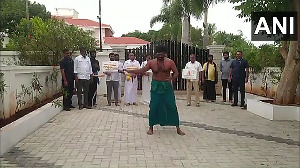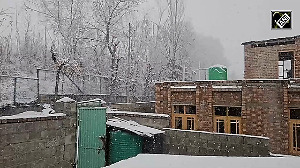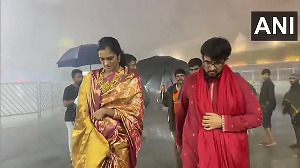
Prema Jain does not begin her day with a prayer or a cup of coffee. Instead, the first thing she does when she steps into her kitchen every morning is take a handful of rice from the rice tin and deposit it in a can. This is her way of sharing what she has with those who cannot afford even one square meal a day.
"Sharing this mutti bhar anaaj [a fistful of rice] is like a prayer for me. The feeling that I contribute in a very small way to alleviate someone's hunger makes me happy. We also give money for feeding the poor, but what gives me immense satisfaction is keeping aside a handful of rice every morning," she says.
Unlike Prema Jain, Priya Mehta does not follow a regular routine of keeping aside a handful of rice every morning. She prefers buying a can of rice separately when she buys her monthly groceries.
"I believe the act is symbolic. I am also a part of the Mutti Bhar Anaaj movement, but in a different way. I feel if all of us who can afford to donate a handful of rice from our daily food do so, we can eradicate hunger from the world. It is a good feeling, a very good feeling. We are not doing it for form's sake. We want to be useful to society," she says.
The 'can' Jain and Mehta refer to belongs to the Chennai Food Bank run by the Rajasthan Youth Association Metro. Businessman G D Ranka established the Bank in 1993.
Ranka was on a business trip to Australia when he was told about a food bank they run there. "They collected food from the industries and gave it to the underprivileged at a subsidised rate. I could not forget this concept of creating a food bank and serving the underprivileged; I kept thinking about it as I flew home."
In Chennai, Ranka discussed the idea with other RYA Metro members. All of them agreed it was a great thought.
was a great thought.
"But they also felt it was beyond our ability to implement the idea since it had to be done on a day-to-day basis. Besides, it was a huge responsibility that involved a lot of money and our time as well," he recalls.
Ranka (right) told his friends if they could run their businesses professionally and successfully, they could also run a food bank with the same kind of enthusiasm and professionalism. But, he confesses, it was a tough task making them believe in him.
As finance was a major concern, Ranka offered to fund the bank with Rs 200,000 every year for the first five years. "I had to take that step. Otherwise, they would be concerned about where the finance would come from, how long we would be able to continue, etc. After all, it was a huge project."
He also converted one of his premises into a storage house for the food bank and met the telephone and electricity expenses.
Among the many schemes suggested by the RYA Metro members, the Mutti Bhar Anaj scheme (or the Janata Scheme) became the most popular; donors did not mind keeping aside a handful of rice or wheat before cooking for the family.
The 650 members who joined the Food Bank were given a container in which to collect the grains. By the end of the month, a vehicle from the Food Bank would collect the container that would, by then, be full of rice or wheat. The Bank tried to involve as many residents as possible from each building so that the cost of collecting the donations would remain low.
At the Food Bank office, the grains collected would be cleaned and packed in separate bags to be distributed to 'needy' institutions. These included orphanages, old age homes, crèches, etc. The institutions were selected after going through applications from these institutions and auditing their requirements and balance sheets. The Food Bank had adopted 13 such institutions in 1993; today, they support 56 of them.
"We choose the best organisations -- the ones which are honest but financially weak. Their purpose should not get diluted because of shortage of food. Instead, they should be able to concentrate on running the institution smoothly. So, we take care of the responsibility of feeding of the inmates one meal a day," explains Ranka.
The members of the association meet every Friday at 7 pm to discuss the Food Bank.
Devendra Mehta, the Bank's present co-chairman, has been associated with the endeavour ever since it began 10 years ago. "The most unforgettable incident in my life was when all of us visited Banyan [an institution for the mentally challenged in Chennai] on our tenth anniversary and served a meal to all its inmates. There were 250 of them and about 100 of us. Serving them and then eating there ourselves was a wonderful experience."
For the first five years, Ranka ran the Food Bank with his own money. Then, when people realised a great idea was being implemented without financial corruption, many started donating money to help keep it going. "People donate only if they have confidence in the way a system runs. Our efficiency has increased over the years. We now run the Bank like we run our businesses. We have learnt from our mistakes. Now, we spend only Rs 2.60 to collect, store and deliver every kilo of grain," he says.
In 1993, the Food Bank collected 35,000 kilos of grain from its 650 members. Till date, it has collected and distributed about 650 tonnes of grain, equivalent to about 5 million meals. They supply one meal per day to all the inmates in the 56 selected institutions under the Food Bank's umbrella.
In 1993, the Food Bank served 1.75 lakh meals; 10 years later, they are able to serve 3.81 lakh meals a year.
Today, the Food Bank collects 7,000 to 8,000 kilos of grains every week. The supply depends on the size of the institution; the bank allots 100 to 200 grams of grain per adult and 50 grams of grain per child. They also conduct surprise visits to the institutions under their umbrella to ensure the food they send is utilised properly.
Today, the Food Bank consists of not only members of the Marwari community, but also people from other communities, says A Sundar Jain, who sees to the day-to-day running of the Bank.
The Food Bank has now introduced several schemes to attract bigger donors, the major one being the Harvest Fellowship scheme. In this scheme, those who donate Rs 5,551 are known as Golden Harvest Fellows; those who donate Rs 11,111 are known as Diamond Harvest Fellows and those who donate Rs 22,222 are known as Platinum Harvest Fellows.
This is in addition to the hugely popular Mutti Bhar Anaj scheme, in which the donors participate on a daily basis. One can also opt for the Anna Dan Yojana, where the donor contributes Rs 951 in cash and donates a bag of rice once a year.
The Chennai Food Bank is now looking to extend its reach -- an affiliate food bank, managed by the Mahaveer International, is already up and running in Nagpur. Ranka says three more food banks are waiting to get affiliation. "By giving affiliation, we expect them to run their food bank professionally. This is the most important factor. Besides, they can always benefit from our experience."
It is Ranka's dream to have a National Food Bank with branches in all cities, towns and villages in India. "If we have a National Food Bank, we can tackle emergency situations like a national calamity; the network of food banks can come together and help calamity-affected areas."
The Chennai Food Bank has supplied food to earthquake-affected people of Latur in Maharashtra and Gujarat. They have also helped those affected by the Orissa cyclone and the Chennai floods.
To celebrate the 10th year of its existence and take one more step towards the goal of a National Food Bank, the Chennai Food Bank plans to start 10 chapters all over India this year. It hopes to add more chapters every year till the entire country has a network of food banks. They also plan to include animals in the list of the hungry who need help.
The Bank also plans to supply food and support through local agencies and help in the rehabilitation of beggars by providing them with vocational training.
"The idea of a hunger and beggar-free India may sound utopian," says Ranka, "but we believe we can achieve it. We need the co-operation of all like-minded people to start a food bank movement all over the country. Our aim is a hunger free world! Like Mahatma Gandhi said, find purpose, the means will follow."
The Chennai Food Bank can be contacted at The RYA Madras Metro Trust, 12, Saravana Street, T Nagar, Chennai -- 600 017.
Phone: 91 44 2431 2096.
Email: ryametro@yahoogroups.com
Contributions to Chennai Food Bank can be drawn in favour of the 'RYA Metro Trust A/C Food Bank'.
G D Ranka's photo: Sreeram Selvaraj
Image: Uttam Ghosh






 © 2024 Rediff.com -
© 2024 Rediff.com -